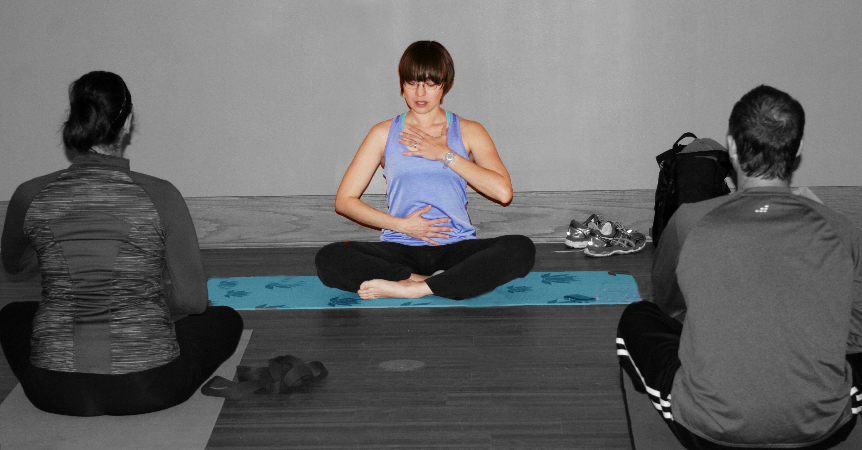Originally published March 20, 2015
By Laura L. Acosta
UTEP News Service
With one hand on her stomach and the other on her upper rib cage, Maricarmen Vizcaino, a doctoral student at The University of Texas at El Paso, instructed students in her noontime yoga class at UTEP’s Centennial Museum to close their eyes, inhale deeply and focus on their breath as it moved in and out of their bodies.
“Start breathing normally, lower your breath, your natural breath for a few more seconds,” Vizcaino said soothingly to the dozen students relaxing on their yoga mats under the museum’s dimmed lights. “Feel every exhalation and inhalation. You have a stillness of both your mind and your body.”

Yoga is a mind-body practice that combines stretching exercises, controlled breathing and relaxation. It has been shown to reduce stress, lower blood pressure and improve heart function.
Research also suggests that yoga can reduce stress hormone levels and may moderate the impact of diabetes. High levels of stress hormones have been shown to raise blood glucose levels and contribute to insulin resistance.
With that in mind, Vizcaino, a Ph.D. student in the Interdisciplinary Health Sciences program in the College of Health Sciences and the School of Nursing, is completing her dissertation on the impact of yoga on the well-being of people with type 2 diabetes.
“In diabetes, (researchers) have found that people suffering from this chronic disease, they have high rates of depression, but they don’t know why,” said Vizcaino, a registered yoga teacher for nine years. She has taught the noontime Yoga for Wellness class for two years.
Organized by the UTEP Wellness Program for faculty and staff, the class helps participants increase strength, flexibility, body awareness, concentration, breathing control and relaxation.
For her study this summer, Vizcaino plans to recruit 40 people with type 2 diabetes to undergo a three-month yoga intervention.
“There’s also a lot of diabetes-related stress, because it’s hard to poke your finger every day and constantly monitor your diet,” Vizcaino added. “Or you’re just overwhelmed by all of the medications. So what I’m trying to see is if yoga can help in any way to improve the well-being in diabetics so that they can be positive about their health and they can take care of themselves and take control over their lives.”
The Centers for Disease Control and Prevention estimate that 29.1 million people, or 9.3 percent of the population in the United States, have diabetes. Among them, 8.1 million people with diabetes are undiagnosed.
To encourage people to find out if they are at risk for diabetes, the American Diabetes Association has designated Tuesday, March 24, as the American Diabetes Association Alert Day.
Claudia Boyd was diagnosed with type 2 diabetes five years ago, just as she was starting the Master of Arts in Communication program at UTEP. Frequent trips to the bathroom and excessive eye blinking at night prompted Boyd to get checked for diabetes. Since her diagnosis, Boyd has lost nearly 50 pounds, is off medication and has become an advocate for spreading awareness about the disease in the community and on campus.
“I think it’s important for students to get checked [for diabetes],” Boyd said. “If you can catch it when you’re young enough and you make the lifestyle changes that are necessary, you have a real fighting chance of adding years to your life.”
For her thesis, Boyd conducted a positive deviance inquiry into Latinos who are affected by type 2 diabetes.
The National Diabetes Education Program estimates that 10.4 percent of Hispanic and Latinos ages 20 years or older have diagnosed diabetes.
Boyd conducted in-depth interviews with 12 diabetics in the community who are managing their diabetes with little or no medications. Instead, they manage their diabetes by adapting their lifestyles. They exercise, maintain a healthy weight, have a strong support system and eat healthfully to better control their blood sugar.
“They have daily routines,” Boyd said about her study’s 12 participants. “The way that they were eating was very specific. They wake up at a certain time every day. They’re not people who like to sleep in. They never skip breakfast. Most of them walk. One of (the participants) was a cyclist at 68 years old. But really there’s just a lot of physical movement.”
Boyd will defend her thesis this semester and plans to graduate in May. She has been accepted to the health communications doctorate program at the University of New Mexico.
Increasing awareness about proper nutrition and diabetes prevention on campus is a goal of UTEP’s Wellness Program.
On March 19, the Wellness Program hosted presentations by the El Paso Diabetes Association and Sierra Providence Health Network on nutrition for employees in UTEP’s Facilities Services department.
To commemorate March as National Nutrition Month, 49 students in the Department of Public Health Sciences’ Community Nutrition Course will present posters on nutrition, including meal suggestions for people to manage their diabetes, from 3-4 p.m. Tuesday, March 24, in the Health Sciences and Nursing Building lobby.
The cost of the Yoga for Wellness class is $113 for the semester and classes are offered Tuesdays, Thursdays and Fridays from noon to 1 p.m. in the Centennial Museum’s conference room. Classes end May 8, but faculty and staff can still join at a prorated price. A new session will begin May 19 and continue until Sept. 1.
The UTEP Wellness program also has yoga videos on its website here.